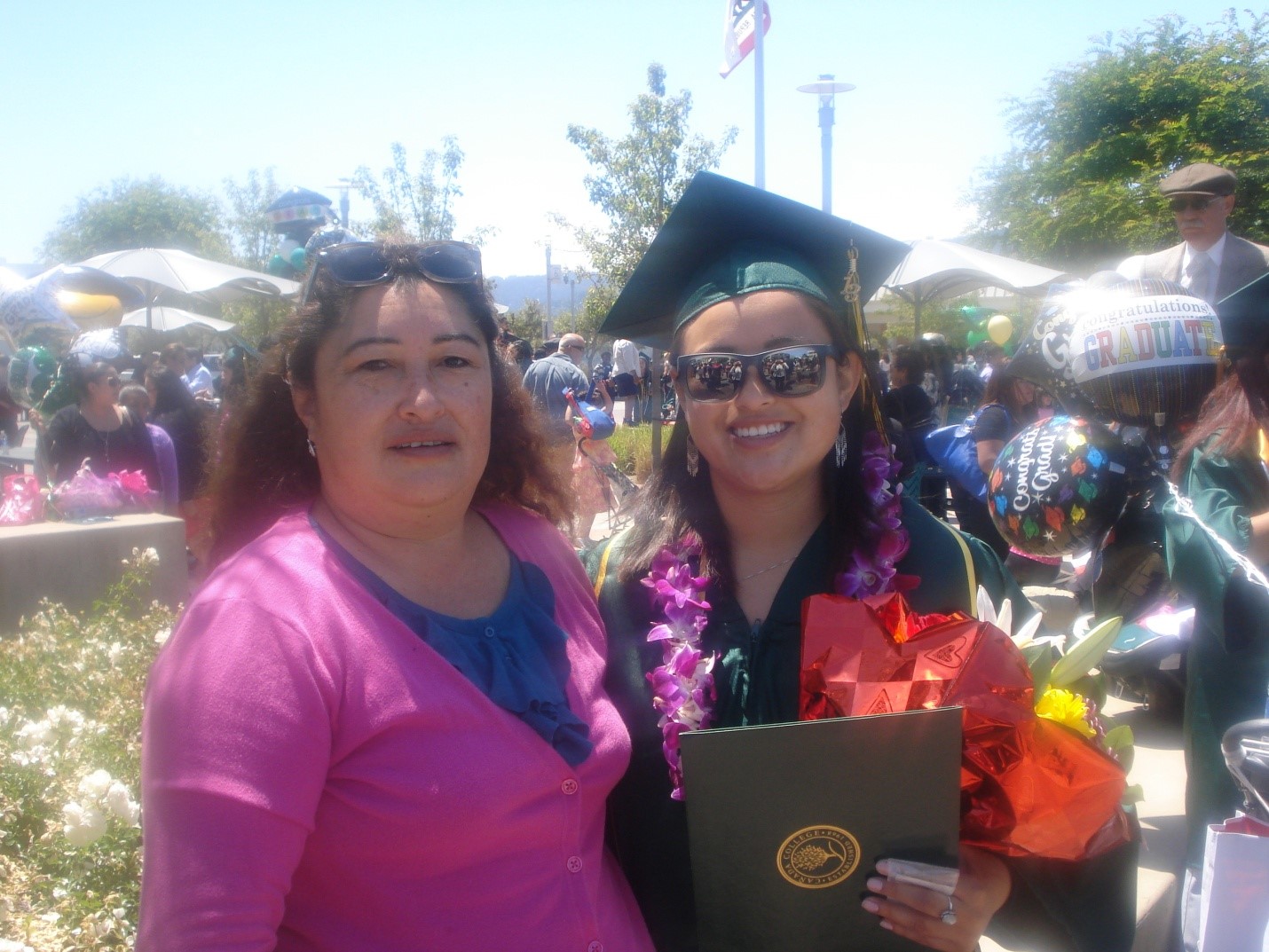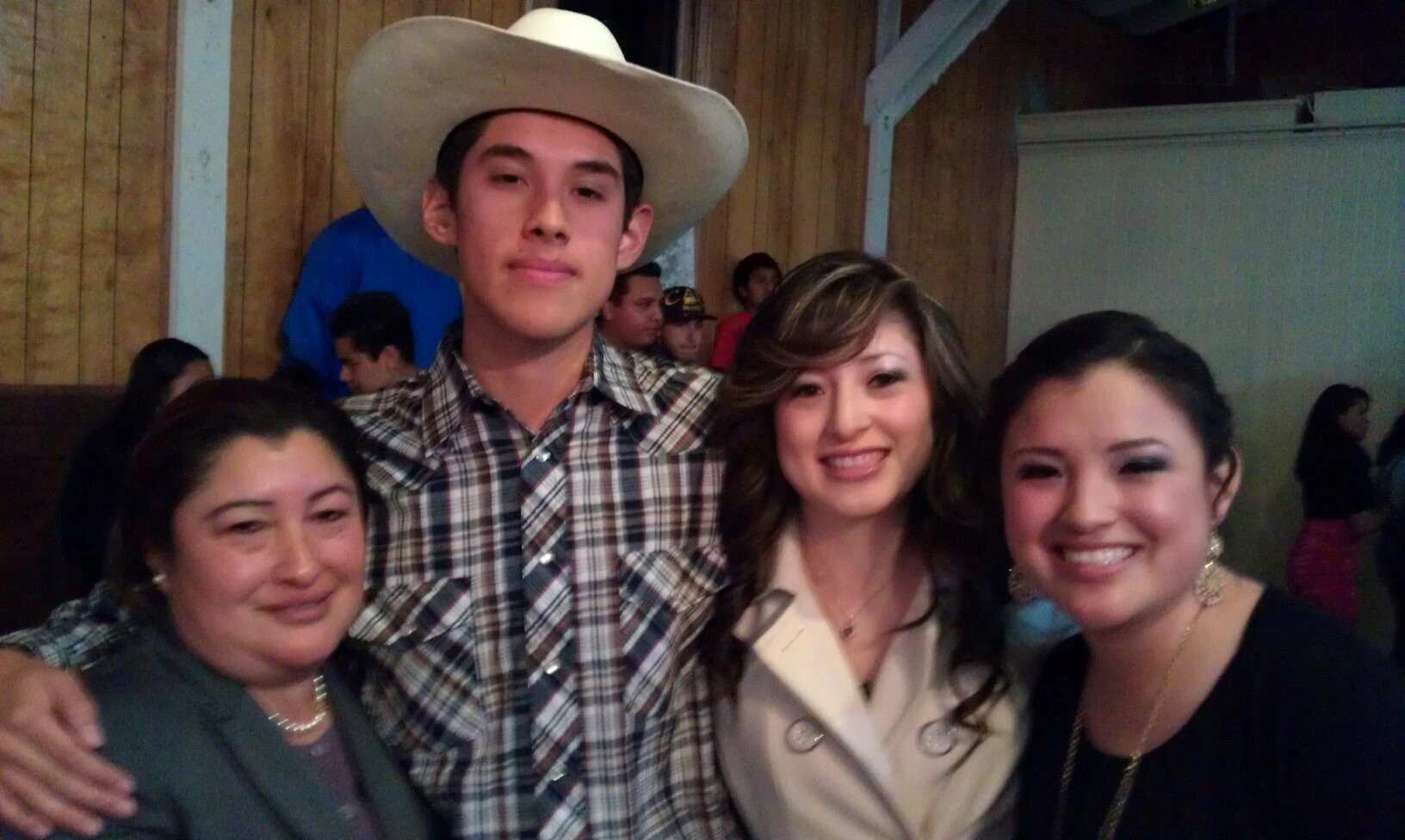Monica Resendiz Gudino has always paid for higher education with long hours at work. Not just schoolwork – side jobs at night and on weekends, earning a wage to pay for everything she can’t afford. Tuition. Books. Transportation. Rent. Food. It was the same for her sister Alejandra Ortega, Puente’s Youth Program Associate, who was the first in their family to go to college. And for her younger brother, Jose Resendiz, who is now studying to be an engineer at a college in upstate New York.
All three siblings were raised on the South Coast. They grew up in Pescadero, after coming from Querétaro, Mexico, graduated from Pescadero High, and earned some of their first paychecks with Puente. It was always clear that they would need to work to afford their education.
To help them with those goals, both Gudino and her brother Jose have college scholarships from Puente in partnership with the Institute for Mexicans Abroad, a Mexican government program several years in a row. (The Spanish-language name is El Instituto de los Mexicanos en el Exterior, or IME.) The Puente program benefits both adult learners and college-age students of Mexican origin or Mexican descent, an IME requirement. The college students must have graduated from Pescadero High, must show financial need, and must have a GPA of 2.5 or higher, and must be enrolled in college full-time.
For higher education, Puente awarded 8 IME scholarships in 2013, 8 in 2014, and will give 10 in the spring of 2015. After this spring Puente will have given scholarships to 13 unduplicated youth, Gudino and her brother among them.
If President Obama succeeds in his efforts to bring down the cost of community college in America, access to higher education – and in particular, a four-year degree – is still a profound financial burden, saddling millions of young students with, on average, $30,000 worth of debt.
Take Gudino, 25, who saved money by starting at Cañada College, a community college in Redwood City, and then transferred to the University of Portland, a private Catholic institution, to pursue a degree in Political Science. Even with a sizeable scholarship from the university, and additional help from federal grants, she’s had to take out $20,000 worth of loans. Room and board alone costs $10,000 a year.

So when it comes to financial aid, “to me, anything helps,” says Gudino. Which is why she has been so relieved to count on Puente’s help every year. Since the start of Gudino’s college career, she has received more than $2,000 in scholarship money through Puente.
Gudino has put the money to good use. “I still have to pay to live here, but through scholarships from Puente, I don’t have to buy all my books out of pocket,” she says. “All I have to worry about is paying for my food and so on.”
Puente has been honored to support qualifying students with an IME college scholarship since 2013, but Puente has provided other college scholarships since 2009, including the Youth Bridges Award. This winter, Puente saw its first-ever crop of scholarship students graduate. It’s profoundly change making, says Rita Mancera, Program Director at Puente. “It’s exciting to see the whole cycle. It makes a huge difference in the lives of their families as well.”
Puente hit another milestone in November 2014 when the Consulate General of Mexico in San Francisco announced it would award Puente $18,500 to support the education of Mexican citizens abroad – the largest such grant awarded by the consulate to any regional nonprofit last year. Of that funding, $8,000 will support adults pursuing their elementary or middle school certificates through Plaza Comunitaria, a curriculum Puente offers in concert with the National Institute for Adult Education in Mexico. The rest – $10,000 – will support college expenses for many local students of Mexican origin or Mexican descent.
Marco Negrete, Head of Community Affairs for the Consulate General of San Francisco, says he is proud to help Latinos of Mexican origin further their dreams of scholastic achievement: from farm workers who left behind unfinished educations in Mexico to young people growing up to become the first in their families to go to college. The funding reflects the reality that many Mexicans come to the U.S. and do not go back to Mexico, as they did twenty years ago.
“The composition of the Diaspora from Mexico has changed. We see these children as the responsibility of the Mexican people,” says Negrete. “They are Mexican citizens before the law, and I think everyone profits when you have these young people who are bicultural, bilingual and better off in terms of their opportunities for employment.”
Immigrant parents often face both culture shock and sticker shock when it comes to the U.S. college system, says Mancera. Puente goes to great lengths to educate both students and their parents about college early on: how to navigate the system, how to transfer to a four-year university, and how get the best grants and scholarships to pay for it all.
“Public Higher education in Mexico is almost free or very low coast. So it is a mind-shift to know that you have to invest in your education here. It is a little frightening for parents to see their kids get a $40,000 loan,” she explains.
That describes Gudino’s mother, Dinorah. When her eldest daughter, Alejandra Ortega, went off to study at Notre Dame de Namur University in Belmont, the college application and financing process was a big learning curve for her and for the whole family, says Gudino. “Being a Hispanic, coming from Mexico, my mom didn’t really know about the university system. We really relied on community services and on Puente” for guidance, Ortega says.
Dinorah Gudino is the mountain at the center of her family. A single mother, she left an unfinished education in Mexico and came to the U.S. determined that her children would have a college degree. Today, Dinorah has three jobs. She is a food server at the elementary school, and she also works at Puente doing childcare. On weekends, she cleans the kitchen and office at TomKat Ranch.

Dinorah says, “Me da mucho gusto que ellos han tenido ganas de estudiar a pesar de estar solos haciéndola yo de madre y de padre. Yo estoy muy orgullosa de los tres que han querido salir adelante por ellos mismos. Estas becas les han ayudado mucho y han utilizado el dinero para sus libros y otras cosas.” (I am very happy that they have the will to study despite us being alone, despite me being both mother and father. I am very proud of the three of them that they have the will to go forward on their own. These scholarships have helped them a lot and they have used the funds for their books and other needs.)
Dinorah set the tone for the rest of her family, and pushed them to go further. “We always knew we wanted to do something more, to have a profession,” recalls Gudino. “When I went off to community college, Mom said, ‘Don't just choose something because it will make money. Find something that will make you happy, too.’”
Gudino’s jobs have always had a community service focus. “I like working and I like taking jobs that make a difference in my community because we all have to start somewhere,” she wrote to Puente in a recent scholarship application essay. Her school job in Portland involves bringing musical acts to campus to entertain students, rather than have them wander off campus and risk their safety in the streets. When she was a student at Cañada College, she would finish class and rush back to Pescadero to supervise an after-school program, and then when that ended at 5:30, she would work childcare at Puente until 9 o’clock at night.
Her brother and sister did similar work, saving their money for college. Jose worked at TomKat Ranch. After earning a bachelor’s degree in fine arts, Alejandra took control of the Dia de los Muertos program at Puente in addition to her responsbilities as Youth Program Associate.
Gudino never intended to spend three and a half years in community college, although graduating in that time was a remarkable accomplishment; the average California community college student takes even longer. She found herself drawn to nursing first, then to accounting. At her mother’s urging, she followed her heart. This December, she will graduate with a B.A. in Political Science and a minor in Spanish. She is contemplating a career in immigration law.
